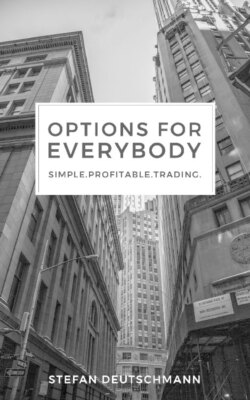Читать книгу Options for everybody - Stefan Deutschmann - Страница 8
На сайте Литреса книга снята с продажи.
1.2 What is an option?
ОглавлениеFirst of all, I would like to talk about the absolute basics of option trading. You are probably an absolute beginner or have never heard that options can be traded and what they actually are. It is therefore important that we first understand what constitutes an option or an option contract at all.
Why and for what purpose were options invented? In essence, they are intended to perform "administrative tasks", namely to minimise risk. This gives you the opportunity to hedge yourself, speculate or use the contracts as a form of insurance. For options trading, it is important that we clearly define and understand the benefits and risks of each position we take. So, what is an options contract? Options are simply a legally binding contractual agreement between a buyer and a seller to buy and sell shares at a fixed price over a period of time. This is the serious difference between options and shares in general. Trading at a fixed price and for a fixed period is agreed.
Essentially, there are two types of options, puts and calls. Call options give the holder of the option the right, not the obligation, to buy a stock at a certain time at a certain price. Once again, it gives the owner the right, but not the obligation, that is, if I own a call option, I have the choice, or one would also say "the option", to buy that stock at a certain price over a certain period of time. Understandable, isn't it? It's a little different with put options.
This gives the put holder the right, but not the obligation, to sell shares at a certain price at a certain time. I can enter into a new sale agreement and have the choice to sell shares at a certain price if it reaches or does not reach or breaks through that price and have the choice to enter into the contract with the person from whom I bought the put.
Imagine coupons, it gets less complicated. Suppose we had a cheeseburger voucher for 1 USD. This is the exercise price we already have of 1 USD. The burger shop and I have determined with this coupon that they will sell me a cheeseburger for 1 USD. Until when is this contract valid? This is the expiration date, let's say it's April. Consequently, we know that we can execute this agreement until April to receive the goods for the price mentioned. So this is a call option. If, for whatever reason, on the day I want to redeem this voucher, cheeseburgers cost 5 USD once, then thanks to the voucher, I can still buy the burger for 1 USD. In this case I would exercise my option to pay only 1 USD.
Now let's take a look at the other side. I don't have to redeem options if I bought them, but in this case it's an advantage for me. But let's take the other side of the example and let's assume that on that day I go to the Diner and cheeseburgers cost just 0.50 USD. In this case I wouldn't redeem the voucher because I wouldn't take advantage of it. In this case I would still have a call option on cheeseburgers, but I will not exercise this option as it is not in my interest. Why should I pay more than I have to? Just transfer this example to stocks like Apple or Amazon or whatever you have in mind. The exercise price, the expiration date and the way the logic works are the same for everything you would put in this place.
Once again, very briefly - it is really important that you internalize these basics. With a call option, you buy the stock at a later date at a fixed price (if you want to). It has an expiry date. So it's like a voucher you buy yourself. This concerns the calls. With put options, you sell shares at a later date at a fixed price. So it is exactly the same - only the other way around.
For newcomers, understanding these contractual relationships is really complicated at first, but once you get involved and the node is broken, option contracts are very easy to understand. Don't worry, we'll go into each component so many times throughout this book that it will become flesh and blood for you. You will see, the world of options is not rocket science.
Remember:
Options are a legally binding contractual agreements between a buyer and a seller to buy and sell shares at a fixed price over a specified period of time.
You can either buy or sell options.
As a buyer, you acquire rights; as a seller, you acquire obligations.
